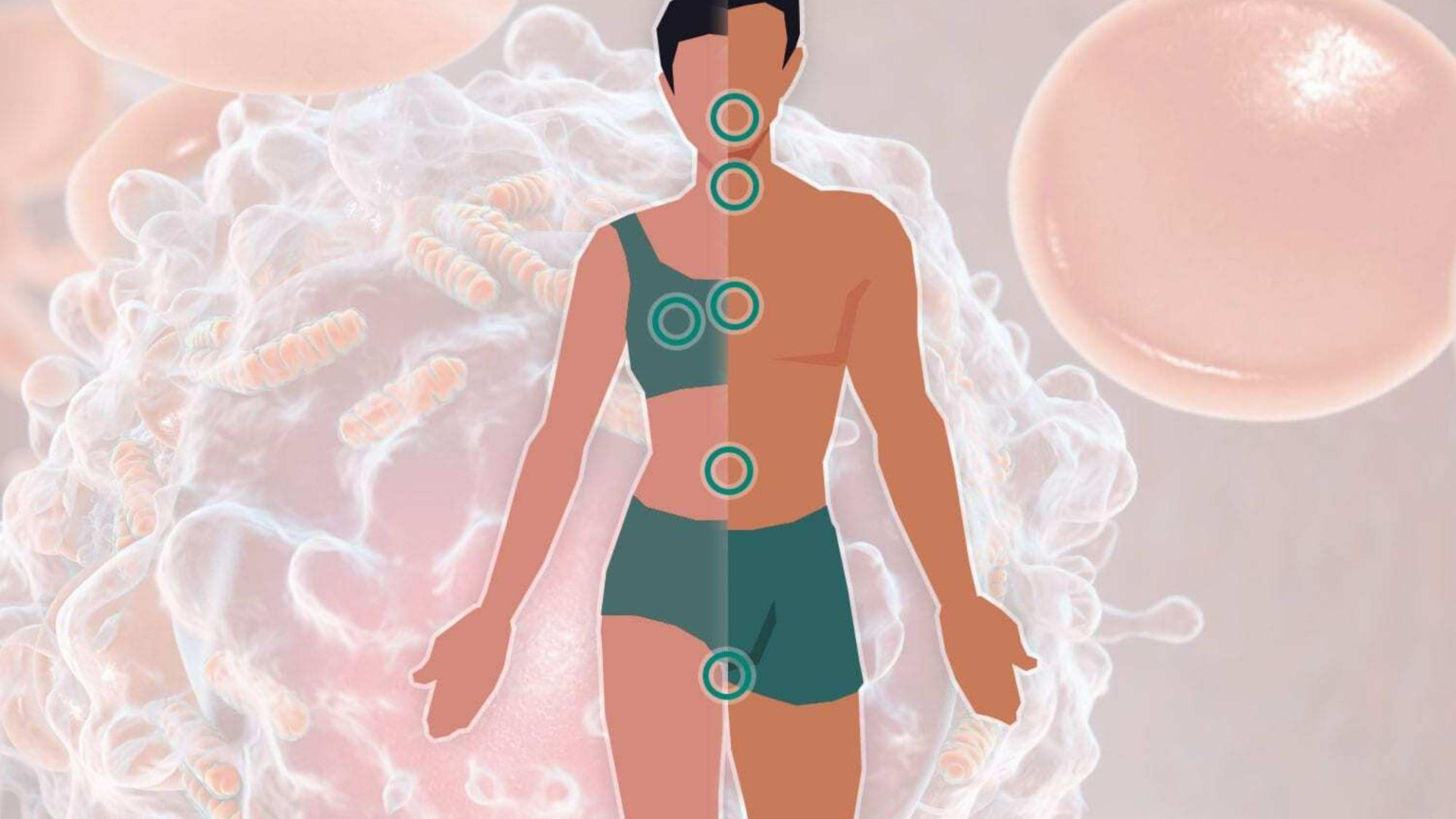THERE are more than 200 different types of cancer that can cause all sorts of symptoms.
From bloating to losing your voice – it seems like nearly anything can be a sign of the disease.

2
But there are 22 indicators that crop up most often, according to Cancer Research UK (CRUK).
And spotting them early and seeing a doctor straight away gives you the best chance of survival, the charity adds.
Dr Julie Sharp, head of health and patient involvement, said: “If you notice a change to your health that’s unusual for you or isn’t going away, contact your GP as soon as you can.
“Your doctor is there for you and wants to hear about any concerns.”
1. Fatigue
It’s fairly common to feel more tired after a stressful week at work or following a disruption to your normal routine, like travelling or a late night.
“But if you’re feeling tired for no clear reason, it could be a sign that something is wrong,” Dr Sharp said.
Fatigue often appears in people suffering from blood cancers like leukaemia, lymphoma and myeloma, as well as breast and prostate cancer.
2. Aches and pains
Unexplained or persistent aches and pains can also be a sign of cancer.
The location of these could indicate the type – chest pain for lung cancer, for example – but it may also mean the disease has spread.
3. Bruising
If you’re clumsy, you’ll likely have a few bruises on your body.
But if these appear when you haven’t bumped into anything, it could indicate something more serious.
Unexplained bruising is a common symptom of leukaemia, lymphoma and myeloma.
4. Night sweats
Having a high temperature or sweating while you sleep could be a sign you have an infection.
It may also be a side effect of certain medications, the menopause or anxiety.
But particularly heavy or persistent night sweats can be a sign of several cancers, including leukaemia, lymphoma, kidney cancer and advanced medullary thyroid cancer, CRUK warns.
5. Weight loss
If you step onto the scales and the number is significantly lower than normal (and you haven’t been trying to lose any weight), it could be time for a cancer screening.
As many as 40 per cent of people diagnosed with cancer say they experienced some form of weight loss beforehand, according to CancerNet.
Unexplained weight loss is most common in patients with lung cancer, upper gastrointestinal cancers, oesophageal cancer, small bowel cancer, pancreatic cancer and liver cancer.
6. Coughing
A certain amount of coughing, particularly during the winter, is to be expected.
It’s also common during hay fever season, and as Covid continues to circulate.
But if your cough is persistent, or you are coughing up blood, it could be a sign of lung cancer.
BBC star Lauren Laverne reveals she has cancer
BBC broadcaster Lauren Laverne has said she is in hospital after being diagnosed with cancer.
The Desert Island Disc host, 46, announced the health update in an Instagram post on Wednesday but confirmed she is expected to make a “full recovery”.
Under a selfie, she wrote: “Right then, some personal news… I recently had a cancer diagnosis.
“It was (thank God) caught early and unexpectedly during a screening test, and I am expected to make a full recovery.”
The BBC presenter thanked the medical teams who have been caring for her with “incredible skill and kindness” while she is receiving treatment.
She also praised her family and friends who have been “absolutely extraordinary every step of the way”.
“I am so very grateful and love you so much,” she added.
“And of course thank you to my colleagues for their support – and for giving me the time off that I need to get better.”
Laverne also encouraged others to get checked out if anyone was avoiding an appointment or getting a test.
She added: “Half of us will get cancer at some point, and if you do, finding out ASAP is everything.
“It’s usually my job to bring the good vibes on air but any you have to spare are very much welcome here.
“Sending loads of love to anyone in a similar boat, or who has made it back to shore.”
7. Lumps or swelling
An unusual lump or swelling anywhere on the body could be cause for concern, Dr Sharp said.
While it may be the result of a sports injury, persistent lumps or swelling, particularly in the neck, armpit, stomach, groin, chest, breast or testicle, should be taken seriously.
8. Appetite loss
Losing your appetite is another red flag symptom of cancer, according to Dr Sharp.
She said: “It can happen for many different reasons, but speak to your doctor if you’ve noticed you’re not as hungry as usual and it’s not getting any better.”
Stomach, pancreatic, bowel and ovarian cancer can put pressure on your tummy and make you feel too full to eat.
9. Mole changes
People with skin cancer might notice a new mole appear, or a change in the size, shape or colour of an existing one.
These marks can also bleed, itch or become crusty, which can suggest melanoma.
10. Skin changes
But it’s not just moles. Other skin changes, such as sores, bumps or growths that won’t heal, can also indicate skin cancer.
The ABCDE checklist – which looks at asymmetry, border, colour, diameter and evolution – can help you monitor changes.

2
11. Heartburn
Some cancers can give you persistent indigestion or heartburn, which can make you burp more than normal.
The most common culprit is oesophageal cancer.
12. Croaky voice
If you have a croaky or hoarse voice for more than three weeks, it could be a sign of laryngeal, throat or lung cancer, CRUK says.
13. Ulcers
Mouth ulcers that don’t heal are common in mouth and oropharyngeal cancer patients.
Dr Sharp said if they stick around for more than three weeks, you should see a doctor or dentist.
Cancer screenings in England
CATCHING cancer early gives you the best chance of survival, and a huge part of that is attending regular screenings.
NHS programmes can help diagnose the disease, or risk of it, and improve the likelihood of successful treatment.
There are three national screening programmes in England: cervical screening, breast screening and bowel screening.
“If you are eligible, please make every effort to have your screening test as they can detect a problem early, before you have any symptoms. ,” the NHS says.
“Finding out about a problem early can mean that treatment is more effective.”
Cervical screening
This is offered in England to people with a cervix aged 25 to 64 and is routinely carried out every three years up to the age of 49, and every five from 50 to 64.
Depending on the result, people may be recalled earlier.
During a cervical screening, samples are tested for high risk Human Papillomavirus (HPV), which causes nearly all cervical cancers.
Those that test positive are then analysed further.
Breast screening
Breast screenings, which involve an X-ray test called a mammogram that can spot cancers when they are too small to see or feel, are usually offered to women aged 50 to 71 in England.
But the NHS is trialling them for women under 50 if they have a high risk of developing breast cancer.
Bowel screening
This test detects whether patients are showing any early signs of cancer.
Men and women aged 60 to 74 are sent an at-home test kit every two years.
This involves providing a small poo sample to be checked for tiny amounts of blood, which could be caused by cancer.
Source: NHS
14. Difficulty swallowing
Difficulty swallowing, known as dysphagia, can be a sign of oesophaegal, mouth or throat cancer.
This may present as a pain or burning sensation, or a tightness, CRUK says.
15. Breathlessness
Most people feel at least slightly out of breath if they’ve climbed some steep stairs or had to run for the bus.
But feeling breathless a lot of the time is something to watch out for.
It is one of the primary symptoms of lung cancer, or cancer that has spread there from elsewhere in the body.
16. Breast changes
You should see your GP if you notice any of the following changes in your breast area as they could be a sign of breast cancer:
- A new lump or area of thickened tissue
- Change in the size or shape of one or both breasts
- Discharge of fluid from either nipple
- A lump or swelling under either armpit
- Puckering, dimpling, a rash or redness on the skin
- Crusting, scaly or itchy skin on or around either nipple
- Sunken nipples
How to check your breasts
It is important to regularly check your breasts for any changes. Breast tissue reaches all the way up to your collarbone and across to your armpit, so it’s vital to check these areas too.
If you feel or see any changes in your breast you should always consult your GP.
Charity CoppaFeel! recommends checking your breasts monthly, so you can pick up on any changes quickly.
Breasts do change naturally as part of your monthly menstrual cycle, so you should get to know your breasts, how they feel and what changes they usually go through to know if anything is out of the ordinary.
Five-step check
There is a five-step self exam you can do at home to check for any changes.
Step one: Begin by looking in a mirror, facing it with your arms on your hips and your shoulders straight. You should be looking for any dimpling, puckering, bulging skin, redness, soreness, a rash or changes in the nipple.
Step two: Still looking in the mirror, raise both arms above your head and check for the same changes.
Step three: With your arms still above your head, check for any fluid coming from the nipples. This can include milky, yellow or watery fluid, or blood.
Step four: While lying down use your opposite hand to check each breast. Using a few fingers, keeping them flat and together, go in a small circular motion around your breasts. Make sure you feel the entire breast by going top to bottom in these small circles. It helps to develop a system or pattern to make sure every inch is covered. Use light pressure for the skin and tissue just beneath, medium pressure for the tissue in the middle of your breasts, and firm pressure to feel the tissue at the back, feeling down to your ribcage.
Step five: Feel your breasts while either standing or sitting, using the same small circular motions.
17. Bloating
It is normal to feel a little bloated every now and then, especially after a big meal or around the time of your period.
But consistent bloating that lasts all day for up to three weeks is one of the most common early signs of ovarian and bowel cancer.
18. Bowel habit changes
The main symptoms of bowel cancer include:
- Changes in your poo (e.g. softer, looser, diarrhoea or constipation that is not usual for you)
- Needing to poo more or less often than normal
- Often feeling like you need to poo, even if you’ve just been to the toilet
If you experience any of these for more than three weeks, it’s important to see a GP.
19. Blood in poo
Blood in your poo, or poo that is black or dark red, is also a sign of bowel cancer and needs to be checked out.
20. Vaginal bleeding
Unexpected vaginal bleeding, including after sex, between periods or after the menopause, is another cancer red flag.
Nine in 10 women with womb, or uterus, cancer have abnormal vaginal bleeding, according to the American Cancer Society.
21. Blood in pee
Blood in your urine, known medically as haematuria, is the most common symptom of bladder cancer.
It is usually painless, but always needs investigating.
22. Problems weeing
Another sign of bladder cancer is being unable to wee.
This is also an early symptom of prostate cancer, as is straining, taking a long time while peeing, a weak flow, needing to rush to the toilet, needing to pee more frequently, or feeling that your bladder has not emptied fully.
Get checked today
Dr Julie Sharp, head of health and patient involvement at Cancer Research UK, said:
“Spotting cancer at an early stage saves lives, so tell your doctor if you notice anything that isn’t normal for you.
“You don’t need to try and remember all the signs and symptoms of cancer – listen to your body and talk to your doctor if you notice anything that isn’t normal for you.
“Signs and symptoms are more often caused by something less serious than cancer – but if it is cancer, spotting it early can make a real difference.
“It’s important to be aware of what is normal for you and speak to your doctor if you notice any unusual changes or something that won’t go away.
“This can help to diagnose cancer at an early stage, when treatment is more likely to be successful.”




